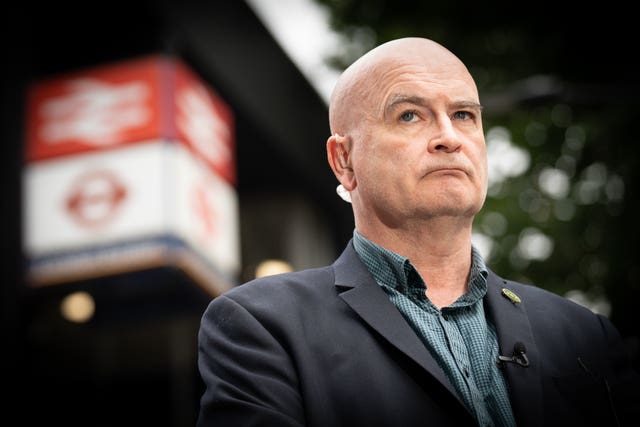Railway workers are to stage a series of 48-hour strikes in December and January in the long-running dispute over jobs, pay and conditions.
More than 40,000 members of the Rail, Maritime and Transport union across Network Rail and 14 train operating companies will strike on December 13, 14, 16 and 17 and on January 3, 4, 6 and 7.
There will also be an overtime ban across the railways from December 18 until January 2, meaning RMT be taking industrial action for four weeks.
A statement said: “Despite every effort made by our negotiators, it is clear that the Government is directly interfering with our attempts to reach a settlement.
RMT announces 4 weeks of industrial action@RMTunion will put on a series of 48 hour strikes in December and January after industry bosses failed to offer any new deals to reach a settlement. pic.twitter.com/IEwpvHEjv4
— RMT (@RMTunion) November 22, 2022
“The union suspended previous strike action in good faith to allow for intensive negotiations to resolve the dispute.
“Yet Network Rail have failed to make an improved offer on jobs, pay and conditions for our members during the last two weeks of talks.
“At the same time Rail Delivery Group, representing the train operating companies, have also broken a promise to make a meaningful offer on pay and conditions and even cancelled negotiations that were due to take place yesterday.”
RMT general secretary Mick Lynch said: “This latest round of strikes will show how important our members are to the running of this country and will send a clear message that we want a good deal on job security, pay and conditions for our people.
“We have been reasonable, but it is impossible to find a negotiated settlement when the dead hand of Government is presiding over these talks.
“The employers are in disarray and saying different things to different people, sometimes at the same time.
“This whole process has become a farce that only the new secretary of state can resolve. When I meet him later this week, I will deliver that message.

“In the meantime, our message to the public is, we are sorry to inconvenience you, but we urge you to direct your anger and frustration at the Government and railway employers during this latest phase of action.
“We call upon all trades unionists in Britain to take a stand and fight for better pay and conditions in their respective industries.
“And we will seek to co-ordinate strike action and demonstrations where we can.
“Working people across our class need a pay rise and we are determined to win that for our members in RMT.”
A Rail Delivery Group spokesman said: “We made real progress over the last fortnight of talks and for the first time in months we can see the outline of a credible deal.
“Further strikes, especially in the run up to Christmas, will disrupt the first normal festive season our passengers have been able to look forward to since the Covid pandemic, taking even more money out of the pockets of railway staff, and will cause huge damage to the hospitality and retail sectors dependent on this time of the year for their businesses.
“We owe it to them to stay round the table.
“Industrial action has already cost the industry millions in lost revenue, is stalling its post-pandemic recovery and threatening its long-term sustainability.
“We are asking the RMT to stay at the negotiating table, work with us towards a fair deal and end a dispute that is harming passengers, the industry, and their members.”
Tim Shoveller, Network Rail’s chief negotiator, said: “No-one can deny the precarious financial hole in which the railway finds itself. Striking makes that hole bigger and the task of finding a resolution ever more difficult.
“Only through reform, that will not result in anyone losing their job, can savings be made that can then be converted into an improved offer.
“While progress has been made over these last two weeks, we still have yet to find that breakthrough.
“We will not give up and hope that the RMT will return to the table with a more realistic appreciation of the situation.”
A Department for Transport spokesman said: “Strike action risks putting the very future of the entire industry in jeopardy.
“These strikes are not only damaging the economy but they’re cutting off people in need of urgent care, children going to school and hardworking families.
“The rail industry is facing serious financial challenges and is in desperate need of vital reforms to address them.
“We once again urge union leaders to work with employers and come to an agreement which is fair for passengers, taxpayers and workers alike .”




Comments: Our rules
We want our comments to be a lively and valuable part of our community - a place where readers can debate and engage with the most important local issues. The ability to comment on our stories is a privilege, not a right, however, and that privilege may be withdrawn if it is abused or misused.
Please report any comments that break our rules.
Read the rules hereLast Updated:
Report this comment Cancel